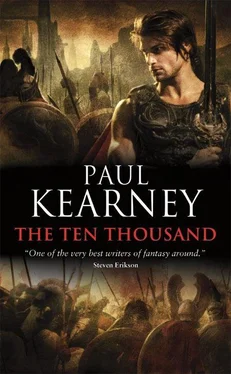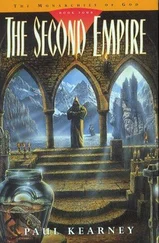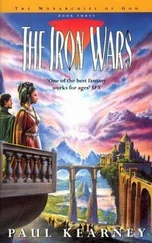Paul Kearney - The ten thousand
Здесь есть возможность читать онлайн «Paul Kearney - The ten thousand» весь текст электронной книги совершенно бесплатно (целиком полную версию без сокращений). В некоторых случаях можно слушать аудио, скачать через торрент в формате fb2 и присутствует краткое содержание. Жанр: Фэнтези, на английском языке. Описание произведения, (предисловие) а так же отзывы посетителей доступны на портале библиотеки ЛибКат.
- Название:The ten thousand
- Автор:
- Жанр:
- Год:неизвестен
- ISBN:нет данных
- Рейтинг книги:5 / 5. Голосов: 1
-
Избранное:Добавить в избранное
- Отзывы:
-
Ваша оценка:
- 100
- 1
- 2
- 3
- 4
- 5
The ten thousand: краткое содержание, описание и аннотация
Предлагаем к чтению аннотацию, описание, краткое содержание или предисловие (зависит от того, что написал сам автор книги «The ten thousand»). Если вы не нашли необходимую информацию о книге — напишите в комментариях, мы постараемся отыскать её.
The ten thousand — читать онлайн бесплатно полную книгу (весь текст) целиком
Ниже представлен текст книги, разбитый по страницам. Система сохранения места последней прочитанной страницы, позволяет с удобством читать онлайн бесплатно книгу «The ten thousand», без необходимости каждый раз заново искать на чём Вы остановились. Поставьте закладку, и сможете в любой момент перейти на страницу, на которой закончили чтение.
Интервал:
Закладка:
He had forgotten about the third man, had lost him in his brief, bloody map of things.
The crest-box grated against bronze, but the pins held. A foot thumped into the hollow of Rictus’s knee. He tumbled backwards, his helm askew so that he was blinded. His feet furrowed the sand uselessly. Someone stood on his chest, and there was a grating noise, metal on metal, as a spearpoint lifted the chin of his helm, slicing open his lower lip as it did so.
The older man, the greybeard. He had hair like a sheep’s pelt on his head and his eyes were dark as sloes. He wore the old-fashioned felt tunic of the inner mountains, sleeveless, ending above the knee. His limbs were brown and knotted with blue veins over the bunched muscles. One handed, he raised the aichme of his spear until it rested on Rictus’s throat and pricked blood there.
When Rictus swallowed the keen spearpoint etched fire on his throat. He felt the blood flowing more freely from his side now, darkening the sand under him. It was trickling down his chin also. He was leaking at the seams. He breathed out, relaxing. It was done. It was over, and he had done something to make them remember him by. He looked up at the washed-pale blue of the sky, the fading of the year’s glory, and the oyster catchers came piping back into it to resume their places on the strand. He followed their flight as far as he could with his eyes.
The older man did also, the spear is steady in his fist as if it had been planted in stone. Behind him, his two companions were thrashing in the sand, struggling and hooting with sounds that seemed barely those made by men. He glanced at them, and there was naked contempt in his face. Then he stabbed his spear in the sand, bent, his foot pushing the air out of Rictus’s lungs, and yanked the helm clear off the younger man’s head. He looked at him, nodded, then tossed it aside. The sword followed, flicked through the air like a broken child’s plaything.
“You lie there,” he said. “You try to get up, and I finish you.”
Rictus nodded, astonished.
The man poked his finger into the bloody lacerated hole in Rictus’s side, and Rictus stiffened, baring blood-slimed teeth. The man grinned, his own teeth square and yellow, like those of a horse. “No air. No bubbles. You will live, maybe.” His eyes sharpened, danced like black beads. “Maybe.” He see-sawed his bloody hand in the air, then slapped Rictus across the face. A blunt forefinger with a filthy, over-long nail tapped Rictus on the forehead. “Stay here.” Then he straightened, using his spear to ease upright again and grimacing, like a man who has been remonstrating with a child.
“Ogio! Demas! Are you men or women? You keen like girls.” He spat.
The hooting noises subsided. The two other men helped each other to their feet and came staggering over, feet dragging in the sand. One of them drew a knife from his belt, a long, wicked, sliver of iron. “I take this one,” he said in a gargled tone that was horrible to hear. He was the one with the hole in his face. It jetted blood with every word as if to lend them emphasis.
“You tried. You failed. He is mine now,” the older man said coldly.
“Remion, you see what he has done to me? I am likely to die now.”
“You will not die, if you keep it clean and don’t stick your fingers in it. I’ve seen men live with worse.” Remion spat again. “Better men than you.”
“Then kill him yourself!”
“I’ll do as I please, you rat’s cunt, whatever you say. Now see to Demas. He needs his nose straightened.”
Some moment had passed, some kind of unspoken compact had been made. There would be no more fighting now. The time which had been- that time of license and slaughter and free-flowing violence-that had gone now, and the normal rules of life which men lived their lives by were slipping back into place. Rictus sat up, feeling it, but hardly able to put the knowledge into rational thought. They would not kill him now, and he would not hurt them either. They were all civilized men again.
The older man, Remion, was cutting strips off the hem of his tunic, but the felt frayed under his knife. He cursed, then swivelled to regard Rictus. “Off with that shirt, boy, I need something to plug this man’s face.”
Rictus hesitated, and in that second the eyes of all three of the other men fastened on him. He drew his tunic over his head, gasping at the pain in his side, and tossed it to Remion. All he had on now were his sandals and a linen breechclout. The wind raised gooseflesh off his limbs. He clamped his elbow to his injured side. The blood was slowing. He spat scarlet into the sand.
Remion ripped the tunic to strips, discarding the blood-soaked part under the armpit. His two companions uttered hoarse, low growling sounds as he saw to their hurts. There was a crack as he levered Demas’s nose back into place, and the man screamed and clouted him on the side of the head. He took it in good part, shoving Demas on his back in the sand and laughing. He slapped Ogio’s hand away from his punctured face and stared intently at the bloody hole, wiping around it.
“When you get back, have the physician stitch that hole closed. What’s behind it will heal in time by itself. For now, let it bleed free; let it bleed the dirt out. A sauroter spike is a filthy thing to have had in you.” He clapped Ogio on the arm, grinning his yellow grin, then rose and padded over to Rictus. In his hand were the rags of the tunic. He tossed them into Rictus’s lap. “Bind yourself up. You’re likely to bleed to death else.”
Rictus looked into his dark eyes. “Why do you not kill me?”
Remion frowned. “Shut your mouth.”
Rictus wondered if he were to die anyway. On the battlefield his wound had seemed a thing of little account. He could still move, run, thrust a spear and behave as a man ought. But now that the bloodied press of the phalanx had been left behind it all seemed so much worse. He looked at the men he had wounded and felt sick at their blood-he who had been around blood and killing all his life.
You want to eat; then something must have its throat wrung, his father had said. Nothing can be had for nothing. When life gives you something, something else must be taken in return. That is the merest logic.
“Why do you not kill me?” Rictus asked again. Bewildered.
The man called Remion glared at him and raised his spear as if to stab. Rictus did not flinch. He was past that, still in the place where his own life did not matter. He looked up with wide eyes. Curiosity, resignation. No fear.
“I had a son,” Remion said at last, his face bunched as tight as his blue-veined bicep. His eyes were black.
They broke the fittings off his father’s spear, leaving an arm’s span of splintered wood, and with this they made a yoke, binding Rictus’s hands before him and then sliding the shaft through that space between spine and elbows. Rictus did not resist. He had been brought up to believe in victory and death. He did not know quite what to make of defeat, and thus stood like a pole-axed ox as they bound him-not with spite-but like tired men who are keen to get home. Hurt men. The blood-smell rose even over the stink of shit on Broken-nose’s thighs.
They picked up the aichme and sauroter. Remi stowed them in the hollow of his tunic. No doubt one day he would burn them out and reset them in virgin wood. Good spear fittings were more valuable than gold. They would see service again. The horsehair-crested helm was claimed by the man with the hole in his face, Ogio. Already, his face was swelling up like an apple, shiny and pink.
Finally, some of Rictus’s numbness gnawed through.
“My father lives in the green glen past-”
“Your father is carrion now, boy,” Remion said. And there was even a kind of pity in his face as he said it.
Читать дальшеИнтервал:
Закладка:
Похожие книги на «The ten thousand»
Представляем Вашему вниманию похожие книги на «The ten thousand» списком для выбора. Мы отобрали схожую по названию и смыслу литературу в надежде предоставить читателям больше вариантов отыскать новые, интересные, ещё непрочитанные произведения.
Обсуждение, отзывы о книге «The ten thousand» и просто собственные мнения читателей. Оставьте ваши комментарии, напишите, что Вы думаете о произведении, его смысле или главных героях. Укажите что конкретно понравилось, а что нет, и почему Вы так считаете.












